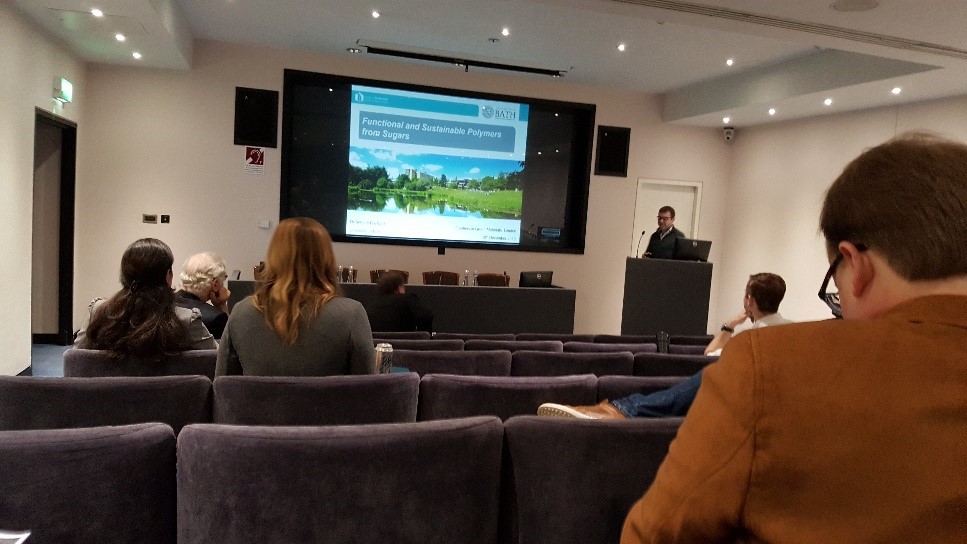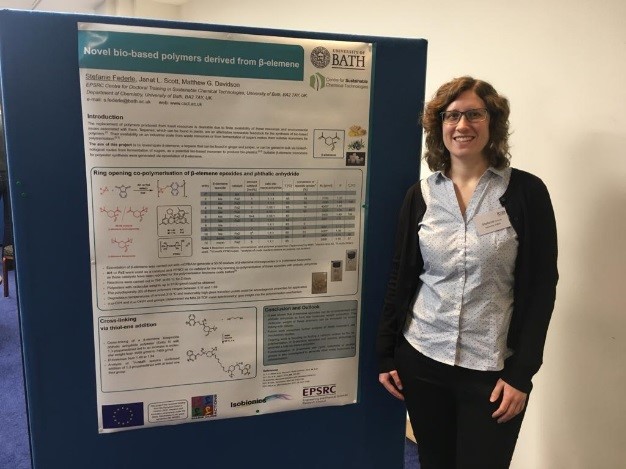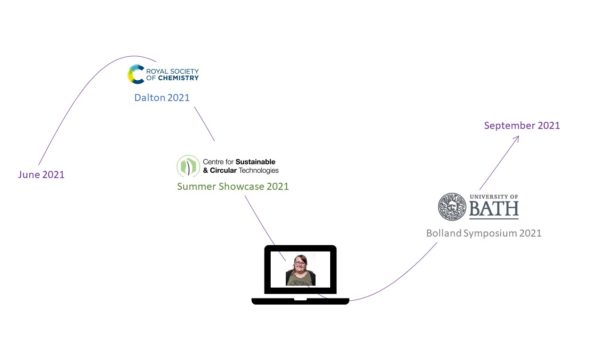Stefanie is a second year PhD student working with Professor Matthew Davidson and Professor Janet Scott on the synthesis of novel bio-based polymers from terpenes.
It’s early Monday morning in London a week before Christmas. I’m fighting my way through all the commuters trying to catch the right tube. I arrive at my destination, Westminster tube station. But no, I’m not doing a nice day of sightseeing or Christmas shopping in London today. Instead, three other PhD students from Bath and I are heading to the Institution of Civil Engineers (ICE) Frontiers in Green Materials Conference. I mean, what could be more festive for a PhD student working in the field of plastics from renewable resources than to go to a conference about Green Materials?!
The Frontiers in Green Materials Conference was organised by the Institution of Civil Engineers (ICE), highlighting the research published in their Green Materials Journal, which was established in 2013. This one-day conference was a surprisingly small and intimate affair with only about 40 attendees, but had a number of high profile speakers nonetheless.
The day started with a plenary talk from Eugene Chen from Colorado State University who presented his work about infinitely recyclable polymers. He was focused on giving insights into the synthesis and recycling of poly(3-hydroxybutyrate) and poly(4-hydroxybutyrate). The morning continued with interesting talks about non-toxic silicon coatings with anti-fouling behaviour, nano-clay and chitosan as coatings for fire retardant materials, and pentablock copolymers made by a switchable zinc catalyst.
Another highlight of the day was Antoine Buchard, who was representing the University of Bath and the CSCT, presenting his research on sustainable polymers derived from sugars.

The afternoon was filled with several talks about lignin, a bio-polymer synthesised byplants, as a renewable feedstock. These included the use of lignin to produce carbon fibres, the conversion of lignin into platform chemicals, the synthesis of biodegradable lignin nanocarriers and lignin-based systems with surfactant and antioxidant properties. In between all the lignin talks, Etienne Grau from the Université Bordeaux gave a presentation describing how vegetable oils can be used as green monomers for the production of hyperbranched polymers.
The most interesting and controversial talk was given by Christopher Wallace from the company Polymateria. Founded in 2016, this UK-based company developed a new technology which makes most plastic biodegradable and compostable and thereby help to combat plastic pollution in the environment. Their patented technology is based on additives which can be added to any plastic during production and processing. This modification with additives is especially targeted for single-use plastic as this is highly littered into the environment. The modified plastic is designed to be degradable in terrestrial environment by a combination of sunlight, moisture air and microbes. Unfortunately, no specific information about the technology was presented due to IP protection. Comments from the audience critically challenged this technology by pointing out that plastic waste reduction and recycling is preferable to leaching into the environment and subsequent degradation. Christopher Wallace agreed with this criticism, but defended that it could be an intermediate technology or perhaps more useful in developing countries. This non-academic talk was definitely inspiring to see that technology for biodegradable plastics is slowly getting integrated into industry.
One of the finishing talks was given by Steve Howdle, from the University of Nottingham, who made a striking appearance wearing a Christmas themed tie. He presented his research on polymerisation in supercritical CO2.
Poster sessions were held during lunch and coffee breaks and provided opportunity for further discussion and networking. Unfortunately, there were no talks on terpenes as renewable feedstock for polymers synthesis (my PhD topic), but I had good conversations about my poster with people working in the area of terpenes.

As it was quite a small conference, networking with other people was very easy. And it was also a good opportunity to catch up with CSCT alumnus Georgina Gregory, who now works as a Postdoc in the Williams group in Oxford, as she was attending as well.
Overall, I very much enjoyed this conference with interesting speakers, inspiring talks and a familiar atmosphere.
Respond


